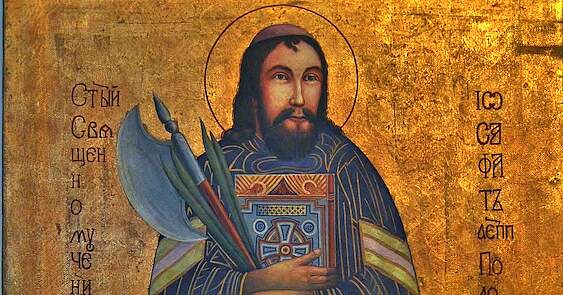
Today the Church honors a great champion and promoter of Orthodox reunion with the Apostolic See in Rome. Saint Josaphat Kuncewicz (born around 1580) was a native of Volhynia in northwestern Ukraine.
A contemporary of Francis de Sales and Vincent de Paul, he looked more like an 11th-century Greek monk, and did penance in the manner of the ancient Thebaid ascetics (1). A priest, archimandrite, reformer of his Basilian order, and finally archbishop of Polotsk (now a city in Belarus), he fought all his life against the consequences of the schism of Photius (2).
In this capacity, he worked with untiring zeal for the reunion of the Eastern and Western churches. He was a great friend of the poor too.
The opponents of the reunion of the two churches sought his death. He himself predicted his imminent fate in a sermon. When St. Josaphat came to Vitebsk, Poland, on a pastoral visit, his enemies attacked his home and began to kill his followers.
Josaphat hurried to meet them and said: "My children, what are you doing? Why are you slaughtering my friends? If you have a grudge against me, here I am!" They rushed forward and killed him with battle-axes on November 12, 1623. He was 43 years old.
Let us unceasingly pray for full Christian unity, and solicit the intercession of the Mother of Christ, who is always present in the action of the Lord and his Church. As Mary, through the Holy Spirit, gave birth to the Son of God, who received from her his human body, she ardently desires the visible unity of all believers, who form the Mystical Body of Christ. Devotion to Mary, a common element that unites East and West, will certainly foster unity.
Adapted and translated from:
https://www.medaille-miraculeuse.fr/billet/st-josaphat-une-memoire-confiee-a-marie.html
(1) Thebaid was a southern region of ancient Egypt. Its name comes from its capital Thebes.
(2) This politico-religious schism affected only the Patriarchate of Constantinople but was the indirect cause of the schism of 1054 which divided the Eastern and Western Churches.